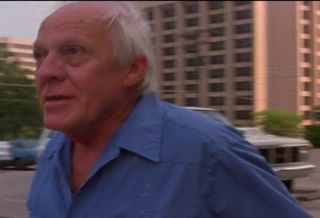
Professor Louis Mackey - -
Professor Emeritus Univ. of Texas, 1967-2004.
Thought I would do a post about Professor Louis Mackey who I was lucky enough to have as a teacher when I went to the University of Texas. While checking to see if he had any new books out, I learned that he died in March of 2004.
I remember, there were courses I regret not taking , while I was at UT. One was at least one Art course, and the other was God and Man, an undergrad course he taught. As It was, I count myself lucky to have had him for
Philosophy in Literature, and Medieval Philosophy.
What a rare individual. He was well known in the world of Kierkegaard scholarship.He always inspired me and impressed me, as to being what a really well trained intellect, and mind could achieve.
I guess I am still in awe of him. As you can see from what was written by his grad student, by the 90s he had quite a reputation on campus, groupies even from other departments. His dry wit, knowledge of literature,
history, poetry and philosophy, and sense of humor use to blow me away regularly. Comet Mackey. How lucky to have been graced by his trail.
It is fortunate we still have his books, his appearances in the Linklater films, Slacker and Waking Life, and I understand a few of his lectures and talks were recorded on video. Whenever I read any of his unique prose style, I can still hear his voice, and his way of positing something, then opposing it, and then coming at the whole point from a 90 degree angle.
I also remember reading an Austin Chronicle article in which he said he loved Austin, and couldn't think of living anywhere else. Also according to Linklater he use to go see punk rock groups on occassion. I remember whenever I went by his office to talk, he always was gracious, had time to talk,and even though I was not one of the better students at doing a philosophy paper, he made things clear to me in a very easy way.
He was both a very gifted teacher, and a unique and unusual scholar, in that he had his own voice, and vision. None of what he published is written in the usual 'academiese', which provides a safe path to tenure, but frequently bores or puts one to sleep. I have two of his books. Eventually I hope to get around to reading all of them. Am going to post here much of a memorial web post by David Hildebrand, a graduate student of his. And then I am
adding much of the obituary of him I found at a UT web site. My hope is that someone googling using blog search will be able to find all this information about him in one spot:
"I heard via the email grapevine that Louis Mackey has died. As far as I know now, he died after a long and grave illness on Wednesday, March 24, 2004 in Austin, TX. He was, I believe, 78 or 79 (b., 1926). Louis was one of my graduate professors of philosophy at the University of Texas at Austin (I was there 1990-1997). Mackey was the chair of graduate admissions when I got in to UT so he may be the reason I am in philosophy altogether.
In addition to taking Louis' 12th Century graduate seminar, I was his teaching assistant for both Knowledge and Reality and Introduction to Philosophy. I sat in on his American Philosophy: Puritans to Transcendentalists and his Medieval Philosophy courses, too.
I guess I knew Louis the way a lot of graduate students did; I considered him a friend but I did not know much about his personal life. I still don't. But we shared a sense of humor which is based on the sense that life is manifoldly and manifestly ridiculous, obscene, and sacred all at the same time. Often one could find Louis in the David L. Miller conference room, our lounge, eating lunch at 12 every day. He'd hold court there, quietly and without ceremony, telling dirty jokes or bantering about literature to whoever was at the table. He somehow managed to be both acerbic and approachable.
Louis was by far the most popular professor at UT while I was there. Everyone wanted him on their committee and until his later years he seemed to always say yes. He had "groupies" from all over the campus--art history, english, comp lit graduate students would sign up for his seminars and it was virtually guaranteed that there'd barely be a seat open by the end.
Louis Mackey was one of the most brilliant and creative minds I have ever met. Exceptionally well read, Louis had a take on the history of philosophy, the history of religion, and, it seemed, all of literature. Everything he absorbed became part of his vision, and he made that vision sparkle for us. It was a lens we could try to peer through to get a better perspective on the puzzle of existence. Louis never promoted or proselytized this vision; rather, it pulled you along after it, like a comet, and made you want to find out what it would be like to tag along, to go where it was going.
And now the Comet Mackey has passed. What a loss this is for all of us. What a great subtraction from the cosmic mix. There will never be another. How thankful I am to have known Louis Mackey."
In Memorium
"Louis H. Mackey (September 24, 1926 - March 25, 2004) was for some thirty-five years a beloved professor in the Department of Philosophy at The University of Texas at Austin, and at his death, he was professor emeritus in that department. He was born in Sidney, Ohio, the only child of Louis and Clara Mackey, received his B.A. from Capital University in Columbus, Ohio, and pursued graduate studies in philosophy first at Duke University and then at Yale University. He received his Ph.D. from Yale University in 1954 for a dissertation on the Danish existentialist philosopher Søren Kierkegaard, "The Nature and the End of the Ethical Life according to Kierkegaard." He became an assistant professor in the philosophy department at Yale, then joined the faculty of Rice University in 1959, and came to The University of Texas at Austin in 1967.At both Rice and UT, as earlier at Yale, he was known for his challenging, engaging, and excellent teaching. In the course of the longest part of his career as a teacher, at UT, Mackey won several teaching awards, including the prestigious Harry Ransom Award for Teaching Excellence in 1987. Many of his students report that Mackey had been the most profound and profoundly formative professor of their entire careers. One student describes his lectures as "architectural masterpieces"; another observes that Mackey approached each philosopher he taught as if "from the inside."His books and articles reflected subtle intellect, wit, vision, and passionate engagement. His book, Kierkegaard:A Kind of Poet, quickly became a classic. Mackey not only clarified and defended that passionate and difficult philosopher but introduced a radically literary approach to philosophical interpretation. Fifteen years later, in a new book on Kierkegaard and under the influence of the new theories of literary interpretation, he published Points of View, in which he effectively deconstructed his own earlier views. He also wrote and lectured widely on Saint Augustine and Medieval Philosophy, and he became a recognized literary critic, writing extensively on literary theory and on literature, including, especially, the works of Gilbert Sorrentino and Thomas Pynchon.Mackey loved music and was an accomplished amateur singer (and sometime director) of madrigal, oratorio, cantata, and liturgical chant, and his artistic talents extended to occasional acting in theater, television, and film. Cinema audiences in Austin know him in particular for his roles in Richard Linklater's films "Slacker" and "Waking Life." He was a faithful member of the Anglican Communion and attended All Saints Episcopal Church in Austin, where he frequently served as lay reader. A week before his death, he was discussing the popular Christian thinker C.S. Lewis with his son Jacob, a Ph.D. student in classics at Princeton. Speaking of himself, the father observed that, unlike C.S. Lewis, he had never felt that he had any easily formulable, final answers. As his son remembers it, Mackey then went on: "I only know one thing: that in the Credo, there is a change in the verb at the end. The creed begins with the verb credo, 'I believe,' proceeds to list the matters of fact, as it were, of faith, but at the very end the verb changes to one of hope. I look with hope for the resurrection of the dead and the life of the world to come."



No comments:
Post a Comment